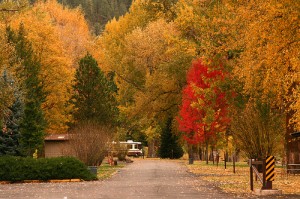In Part I of Small Towns Rock, I described how I feel I’m straddling the urban-rural divide since I live in Portland, Oregon, but steadily travel for my work into its small towns and rural areas. I love all these places — but wish they loved each other more. In particular, I think urbanites underestimate the strengths of small towns and rural areas. This is Part II of II.
- Prices are lower in small towns. Your dollars go farther, from real estate to restaurants. A few years ago my work landed me in La Grande, a town of 13,000 in Eastern Oregon. At Ten Depot, a lovely restaurant in an historic downtown building, I had two gin and tonics, a hamburger with fries and cherry cobbler for dessert – and actually got change back when I paid with a 20 dollar bill. I was shocked that a good (and large) dinner could cost so little. Oh, and they brought me my own fresh vegetable tray with ranch dip first thing, as a free appetizer. The food was fresh and delicious and the staff friendly. I really recommend Ten Depot restaurant in La Grande, Oregon. Some nights it has live music and dancing, too.
- Crime is less prevalent in rural areas. Crime exists everywhere people do, but it is more prevalent in big cities. I wrote in Part I of this piece about being hustled in Miami, and how I’ve never been hustled in a small town. To some degree, my experience is representative. This thoughtful research explains that rural areas do have less crime, at the same time that they actually have the same social problems urban areas have, just with less intensity and later in time, which is sometimes described as ”the caboose on the train” phenomenon.
- Nature is generally close by in small towns. Think about it. In a small town, you’re generally not far from some kind of field, creek, forest, prairie, mountain, wetland, shoreline, etc. In a city, even one with some good parks, the urban hardscape of concrete and asphalt, known as the built environment, is extensive. The ratio of nature to concrete is much higher, on average, in small towns. Human beings thrive more in proximity to nature. The air quality is better, on average, in rural areas and small towns than it is in big cities. Urbanites often spend a lot of time and money trying to even occasionally get out into the lovely, natural areas that ruralites enjoy on a daily basis.
- Small-town fun tends to be affordable and available to everyone. While there are more things to do in a big city, a number of those activities are expensive, and they may or may not be available or welcoming to an outsider. In the 90′s I visited Flagstaff, Arizona, which had about 46,000 people then. Because I worked as a counselor at a non-profit agency I was vacationing on a shoestring, for example, cooking all of my meals at the hostels I stayed at rather than eating in restaurants. One evening I found a local square dance that charged just a few dollars admission, and besides enjoying the dancing, I found the folks quite friendly. The only problem was that I’ve never been good at judging people’s ages. After the man I was talking with during the break had mentioned his son a few times, I asked, “What grade is your son in?” Amused pause. “Ah, he’s an engineer,” the man explained. We both laughed. At least I had erred on the side that made him feel good.
When I visited New York City during college, my relatives treated me to a Broadway play. It was a polished, highly professional production, and a wonderful experience for me. But I didn’t necessarily have more fun in NYC than in Flagstaff, or La Grande. It was just a different kind of fun. My NYC fun was what our culture holds up as high-status and enviable. But it involved me passively watching others do something, while my Flagstaff fun had me actively doing something. Which leads me to my final point on why small towns rock, that goes to the heart of the Diamond-Cut Life’s focus on more joy and less stuff.
- Small towns are good for doing, and big cities are good for consuming. If you want to consume things or be passively entertained, cities are great suppliers. You’ll have more movies, department stores, specialty stores, sports events and restaurants to choose from in big cities. However. If you want to do things rather than buy things or sit still watching things, small towns rock. Michael Perry writes in his lively book Truck: A Love Story about being part of the volunteer fire department in a small Wisconsin town and doing the keynote speech at the local high school’s graduation ceremony. He is active, engaged, a contributor. Mr. Perry’s dynamic is sometimes described as being a big fish in a small pond. But another way of describing it is that every person is more needed in less populated areas, and makes more of a difference. I would even suggest that being a citizen tends to trump being a consumer in smaller towns. I know which one I’d rather be.
But of course, a person can choose citizenship over consumerhood no matter where you live. And choice, to me, is the most powerful part of being human.
photo courtesy of Gerry Slabaugh



 Subscribe
Subscribe
I think Edinburgh is the perfect balance. A big enough city to have lots of theatres, cinemas and restaurants but with lots of real green space in the city and just outside.
Sounds lovely. Perhaps Thor and I should visit someday.